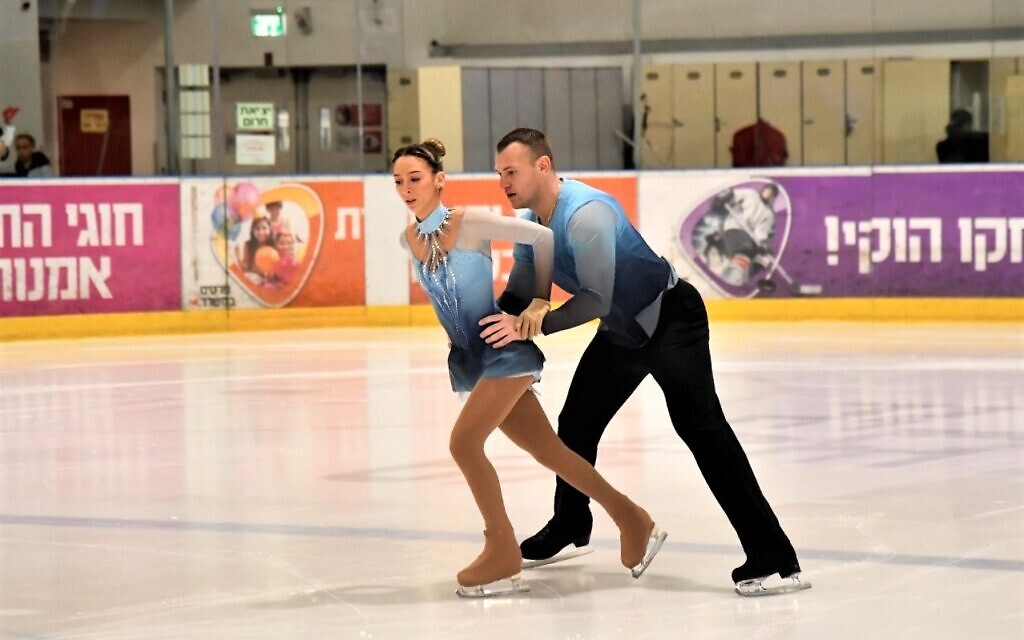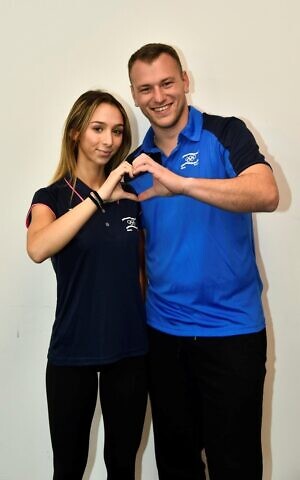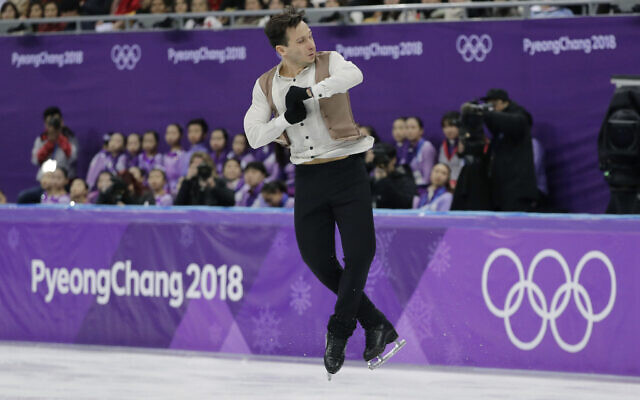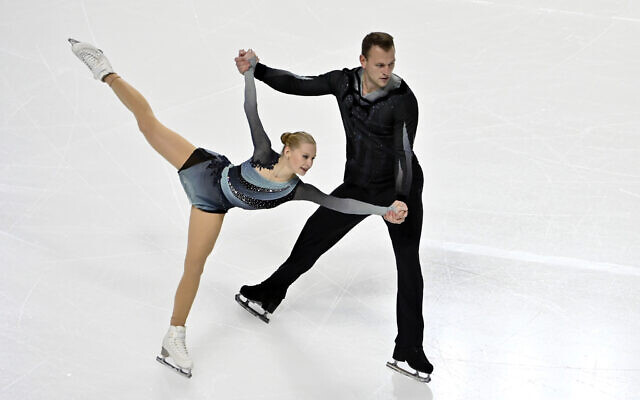Hailey Kops will team up with veteran Israeli Olympian Evgeni Krasnopolski on the ice at the 2022 Winter Games

When the 2022 Winter Olympics kick off in Beijing in February, four Israeli ice skaters will lace up their skates and take to the ice to represent the Jewish state.
Three of the four are veteran Olympians, each returning for their third Olympic Games next year. One, 19-year-old US native Hailey Kops, will be making her Olympic debut in Beijing as a pair skater competing for Israel with her partner, Evgeni Krasnopolski.
Kops, who lives in New Jersey, became an Israeli citizen several years ago, and has competed for Israel at multiple international competitions.
“Being a Jew, I always felt connected to Israel. There was always a part of me that always wanted to be more part of it than I already was,” Kops told The Times of Israel in an interview last week at the Ice Peaks skating rink in Holon.
“The fact that I had the opportunity to represent the country that I feel so close to is really nice, whether I live here or not,” she added. “To be able to represent the Jewish people and this country is something that I always wanted to do.”
Kops grew up in an Orthodox Jewish home in New Jersey with parents Lisa and Steven Kops, both of whom were also at home on the ice – Lisa as a figure skater and Steven in hockey. They encouraged all of their children to pursue ice skating alongside their studies in Jewish day school, and Hailey took to the sport with alacrity. She teamed up with Israel’s Artem Tsoglin and represented Israel at the 2017 World Junior Championships, 2018 World Junior Championships and 2019 European Championships.
After parting ways with Tsoglin, Kops decided to take a break from the sport. She graduated from high school and spent a gap year studying at the Midreshet Amit seminary in Jerusalem.
“It was amazing. I never really thought I’d have the opportunity to go to seminary and I did,” said Kops. “I grew up in a Modern Orthodox home, so just going and learning more about why I do what I do and being able to make new friendships and [learning] how to work on myself was really nice.”
It has not always been easy for Kops to maintain a traditional Jewish lifestyle alongside the highly demanding schedule of a competitive athlete, with constant practices and international competitions.

“Lisa and I allow our children to play sports on Shabbat but the difficult task was getting to the various sporting events, because we don’t drive on Shabbat or use our phones,” wrote Steven Kops in a Facebook post in October about Hailey’s journey to the Olympics. “Everyone embraces and practices their religious beliefs differently… [Hailey] quietly and in her own way, represented what it meant to be a Modern Orthodox Jew competing at an elite level,” he wrote, adding that she would not fly on Shabbat or Jewish holidays and “do her best to walk to the rinks or arrive before Shabbat.”
While she was at Amit, said Kops, she focused on her Jewish studies, but still kept up a little bit of training, “enough that I was okay now.”
When she returned to New Jersey in June, Boris Chait, the head of the Israel Ice Skating Federation, called with an offer for Kops to partner up with Krasnopolski. “Our main requirements” before agreeing, wrote Steve Kops, was that “Hailey would not practice or train on Shabbat.”
After just three months of training together, Kops and Krasnopolski qualified for a spot at the Olympics by finishing fifth overall at the 2021 CS Nebelhorn Trophy in Germany in September.
In just a few weeks, they will hit the ice in Beijing in the pairs skating competition, in what will be only the third time Israel has sent athletes to this event.
“I dreamed of it; I always hoped I would get there,” Kops said of competing at the Olympics. “It’s crazy, it’s an amazing opportunity and I’m thankful to my team for being able to give me the opportunity.”
Krasnopolski, 33, a native of Ukraine who moved to Israel at age 3, will be competing at his third Olympics in February, after he was the first to ever represent Israel in pairs skating at the 2014 Games.
“I’m very proud to represent Israel for the third time,” he said during a press conference at the rink in Holon last week. “Any time the Israeli flag is waving is a huge sense of pride for me.”
Kops and Krasnopolski will be joined in Beijing by Alexei Bychenko, competing in the men’s singles in figure skating at the Olympics for the third time, and Vladislav Bykanov, who will also take to the ice for the third time in the men’s short track speed skating.

The final makeup of Israel’s delegation to the 2022 Winter Olympics has yet to be determined, with some qualifiers still ahead. Israel has yet to ever win a medal at a Winter Olympic Games. And most analysts don’t expect that to change this year.
Galit Chait, a former Israeli Olympic ice dancer – and Boris’s daughter – who is now the head coach of Israel’s figure skaters, oversees their training in northern New Jersey. Ahead of the Games, she said, their expectations are high, but that doesn’t necessarily mean winning medals.
“I hope that they make it to the finals,” Chait told The Times of Israel of Kops, Krasnopolski and Bychenko. “They’re going to train very hard right now to get ready, and we’re ready to go.”
Just earning their qualifying spots for the Olympics, said Chait, is a major accomplishment.
“Everyone has put in a lot of work to qualify for these Games,” she said. “It wasn’t easy, it’s a lot of hard work and determination to get qualified, and as a team they work day in and day out, so I’m very proud of my athletes… we have a small team but it doesn’t take away from the quality of our team.”
The competition is fierce long before the Games begin, she added. “There’s only 19 teams in the world that are competing in pairs, 19 out of the whole world,” said Chait. “Maybe we’re not going to be gold, silver, bronze, but the fact that we’ve actually qualified and everything is a great success.”

Israel, not exactly known for its wintry weather, still has a long way to go in terms of the infrastructure, backing and support necessary to nurture winter Olympic athletes. While the Holon rink is officially the Israeli skaters’ home court, they train at a facility twice its size in northern New Jersey.
“We need a big rink, NHL-sized, or Olympic, because that would just change everything,” said Chait. “You would be able to bring international competitions here. That would just change the whole situation.”
But Boris Chait stressed how far Israel – which competed in its first Winter Olympics in 1994 with just one athlete – has come in winter sports.
People used to say that Israel is “a country where they see ice only in glass,” he joked. “Nobody really knew in Israel what ice skating is… today, we have a place in the world. Today, everybody knows that Israel comes and Israel is going to compete.”
As reported by The Times of Israel
